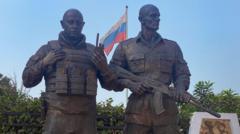A monument in honor of Yevgeny Prigozhin, the late leader of Russia’s Wagner Group, has been officially unveiled in the Central African Republic (CAR). This statue, which also features Prigozhin's aide Dmitru Utkin, marks a significant recognition of their contributions to the region. Both figures, who were killed in a plane crash in August 2023, are depicted in the statue, which shows Prigozhin in bullet-proof clothing with a walkie-talkie, while Utkin brandishes an AK-47 rifle.
Since 2018, Wagner forces have been present in CAR under an invitation from President Faustin-Archange Touadéra, aimed at combatting armed rebellions. This partnership has enabled Wagner to secure contracts for operating lucrative gold and diamond mines, solidifying their foothold not only in CAR but also in various African nations. According to a statement from the CAR national police, the monument represents an aspect of the strengthened bilateral ties between CAR and Russia.
The unveiling ceremony gathered high-profile military figures including Defence Minister Rameau Claude Bireau. Importance was placed on the effectiveness of Russian support, with President Touadéra claiming that under Wagner's assistance, armed groups have been significantly disadvantaged.
Prigozhin and Utkin were killed along with several others in an aircraft crash shortly after a failed mutiny within Russia, a situation which has led to speculation about the Kremlin’s potential involvement in their demise. Despite the turbulence, Wagner Group has relaunched itself as ‘Corps Africa’ although it remains operational under its original name in CAR.
The existence of a statue honoring the Russian forces—depicted as protectors—adds to the context of Prigozhin's memorial. While some local populations express gratitude for the relatively lower levels of violence compared to previous years, criticisms abound regarding the trade-offs between resource exploitation and security.
The CAR, rich in natural resources, continues to grapple with extreme poverty and instability characteristic of its post-colonial history since gaining independence from France in 1960. While violence persists sporadically—particularly in clashes between rebel factions and the Wagner-supported national army—government support of Russian mercenaries raises ongoing ethical and governance concerns in a country already fraught with challenges.





















